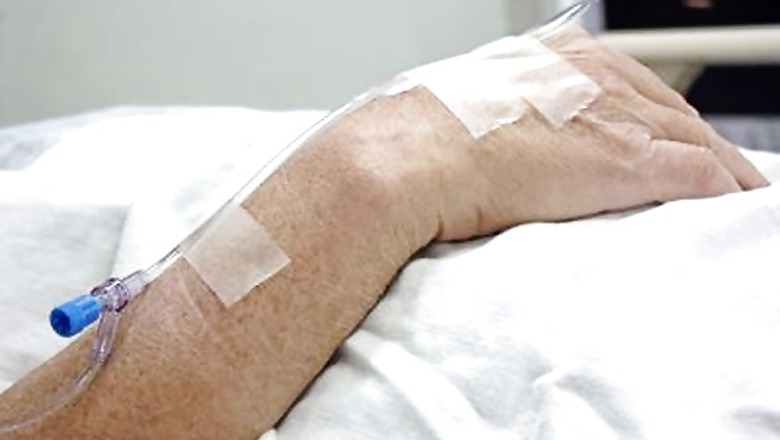
views
The newly emerged Covid-19 virus has changed our lives in many ways. The lockdowns imposed by many countries have closed all but essentials services to prevent community transmission of the virus, with more stringent steps threatened as case numbers and mortality data grow by the minute.
Healthcare, an essential service at any time but never more so than in a crisis such as this, has been severely affected as the primary focus is shifted to the management of the crisis and other health emergencies rather than routine care.
Many elective surgeries are being deferred or delayed and patients are being advised to avoid non-essential hospital visits and switch to tele-consultation for arising problems.
For many cancer patients this situation is a living nightmare as they face not only the threat of Covid-19, the pressure of lockdown restrictions but also intense uncertainty regarding the future of their cancer treatment and its associated outcome.
Cancer patients are facing a stark choice regarding continuing treatment or delaying it to mitigate the Covid-19 risk. Many cancer patients in India travel huge distances to receive treatment but right now they cannot access treatment even if they wish to proceed as airlines and rail services are not operating.
Understandably, patients want concrete answers about when they can start cancer treatment, what the implications are if there is a gap in their treatment on their chances of recovery and the risks for their safety if they do attend the hospital.
There is no one-size-fits-all answer to these questions.
The psychological impact on patients and their families is starting to reveal itself.
The son of a recently diagnosed patients wrote to us: “My father has been diagnosed with kidney cancer with lung metastasis 21 days ago. His immunohistochemistry sample could not be processed in this lockdown and he was advised to stay at home considering his age of 83 years. I am worried about his cancer but at the same time this infection too.”
Another patient’s family wrote: “Is it safe to visit hospital for PET-CT as I have heard that cancer patients are more prone to catch infection?” His mother has colorectal cancer and is post-surgery and post four cycles of chemotherapy. She was scheduled for PET-CT for evaluation but was frightened to approach to the hospital in the lockdown.
In ordinary times, cancer patients face uncertainty and have to fight on many fronts to deal with the economic, social, family and personal challenges that a cancer diagnosis brings. During active treatment cancer patients require frequent hospital visits, pre-operative & post-operative stays, chemotherapy sessions, laboratory tests and radiological imaging, daily appointments for radiotherapy sessions (often over weeks). Extended hospital visits mean that cancer patients, many of whom are immunocompromised as a result of the side-effects of treatment, are more likely to be exposed to infection.
Data emerging from many countries affected by the pandemic suggests that the majority of the Covid-19 patients who require hospitalisation are suffering from heart disease, respiratory disease, diabetes, hypertension or cancer.
Here we have tried to address many of the concerns of cancer to minimise the fear and uncertainly related to cancer treatment and its outcome amidst this Covid-19 crisis.
Which cancer patients are at high risk for coronavirus infection?
Cancer patients who are older (more than 70) and having one or more associated co-morbidities, i.e., cardiovascular diseases, hypertension, diabetes, and lung diseases are at high risk for coronavirus infection.
What are the symptoms of coronavirus disease in cancer patients?
Coronavirus diseases are associated with symptoms which include fever, a new persistent dry cough, difficulty in breathing, fatigue, sore throat. New evidence suggests some patients are experiencing the loss of smell and taste. Presentation of the disease is not different in cancer patients but chances of progression to severe or critical diseases are more common with cancer patients.
What are the chances of getting coronavirus infection if cancer patients come to hospital for their treatment?
Chances of getting coronavirus infection does increase with frequent hospital visits. It has been reported between 10 - 30% in reports from different hospitals in China where Covid-19 patients were getting treatment.
Should I visit the hospital?
In this present scenario, the best advice is to minimise the hospital visits for cancer patients and that tele-consultation can be a good alternative to avoid direct contact between patients and cancer care provider for the vast majority of routine appointments.
I am currently having cancer treatment. Should I continue my treatment or stop it as I have to go to hospital frequently for my treatment.
No cancer patients should halt, postpone or cancel their treatment as stated in guidelines from various cancer institutions/societies/hospitals. Patients who are in hospital must adopt the contact and droplet precautions, which means wearing a mask, covering outdoor clothes and extra sanitation steps. Hospital staff should be following the same guidelines. Discuss how to minimise visits with your healthcare provider or if any procedures can be done at home.
My cancer doctor has advised to me delay the surgery/chemotherapy/radiotherapy. Should I follow my doctor’s advice or get surgery/chemotherapy/radiotherapy done at another hospital?
There is a time limit on how long someone can delay cancer treatment without it impacting their recovery. Patients need to have a discussion with their cancer care provider about their unique circumstances. One size does not fit all. In some cases, patients may be reasonably advised to switch to other treatment modalities. If there is an issue related to transportation and stay, patients are encouraged to start the treatment at the nearest cancer centre where appropriate treatment is available rather than travel.
What precautions should cancer patients take amidst the coronavirus crisis?
Cancer patients are advised to practice social distancing, maintaining at least a two-metre distance from anyone who does not share their home. Regular handwashing with soap or alcohol-based hand rub is a necessity. If a member of your household develops Covid-19 symptoms such as cold, cough or fever they should self-isolate as much as is reasonably practical. Patients are advised to avoid crowded places and stay in well-ventilated rooms. Patients are advised not to shake hands and organise longer prescriptions for regular medicines well in advance of running out.
I have been receiving information on WhatsApp, Facebook and other sources about coronavirus prevention and treatment. How can I confirm what is real and what is fake?
A lot of incorrect information has been circulating leading to fear and uncertainty. There are trustworthy information sources available, being updated regularly as new evidence emerges and is evaluated by experts such as the World Health Organization (WHO) and the Indian Council of Medical Research (ICMR). Patients and their caregivers should use these and not rely on social media.
In conclusion, cancer patients and caregivers are facing difficult decisions to understand and weigh up the risk and benefits of continuing treatment in its current form in this crisis.
Although current guidelines support the continuation of treatment where possible, patients must talk to their individual cancer care provider to explore if their treatment should be reasonably modified in the ways outlined above to reduce their individual risks of exposure to Covid-19.
(Dr Abhishek Shankar is Assistant Professor in Radiation Oncology at Lady Hardinge Medical College & SSK Hospital, Delhi. Dr Deepak Saini is Project Officer at Cancer Control and Prevention Division of Indian Society of Clinical Oncology, Delhi. Views expressed are personal.)
















Comments
0 comment